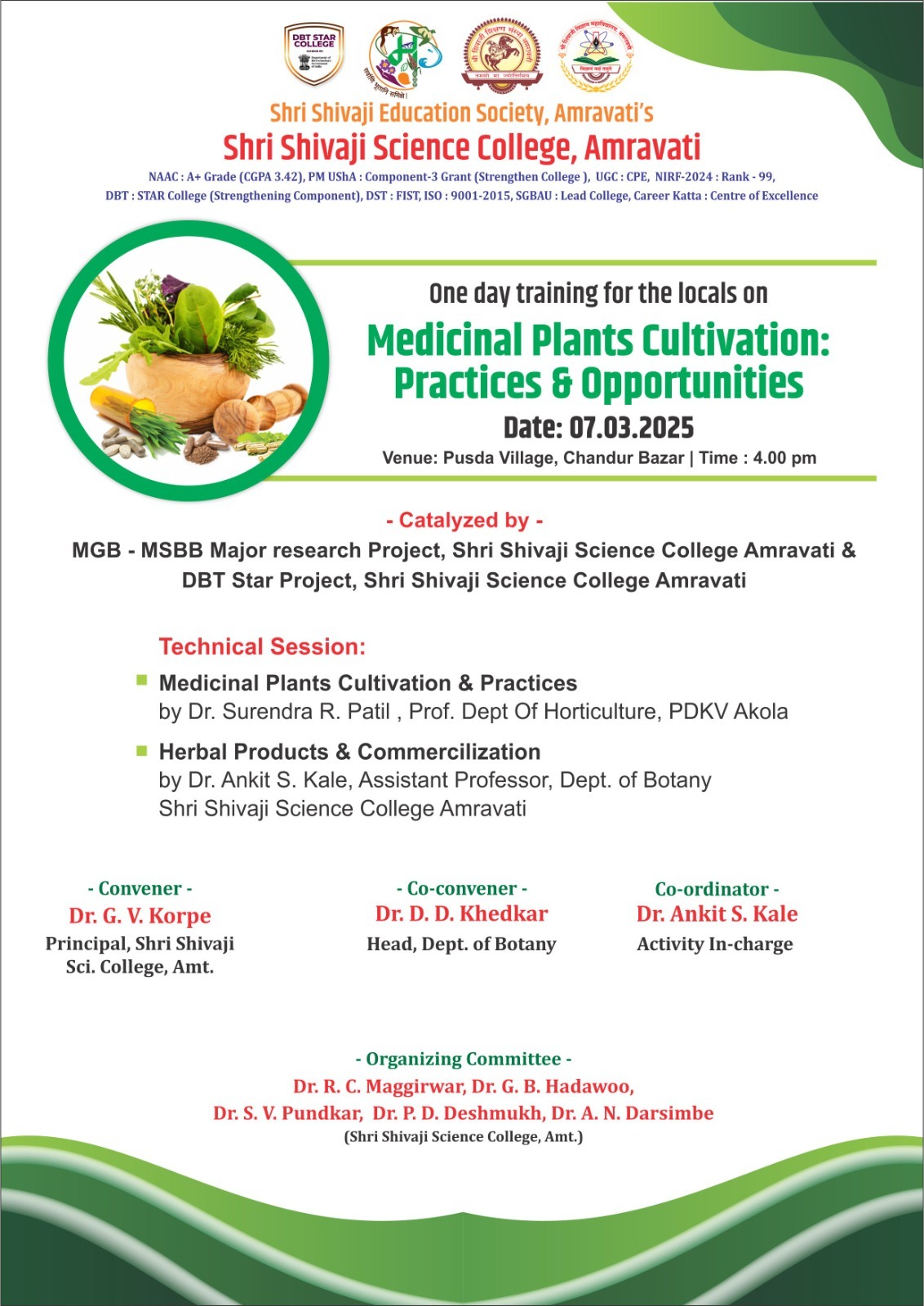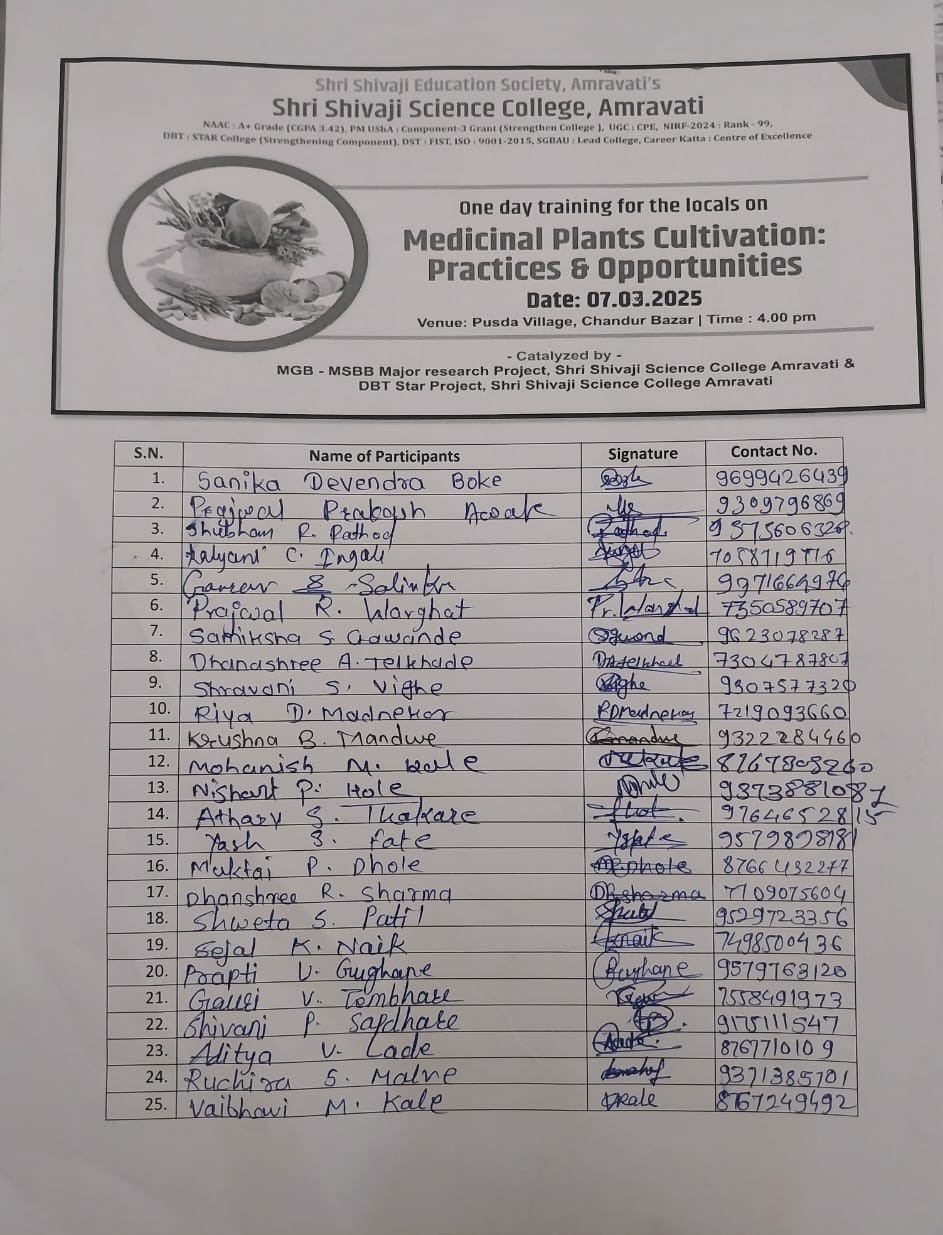SHRI SHIVAJI SCIENCE COLLEGE, AMRAVATI
DBT STAR COLLEGE PROJECT ACTIVITY
ACTIVITY REPORT

Medicinal Plant Cultivation & Practices
Activity Dates: 07.03.2025
Type of Activity: Other
Organizing Department: Department of Botany & Bioinformatics
Program Coordinators: Dr. A. S. Kale
Head of the Department: Dr. D. D. Khedkar
External Collaborator (if any): NO
Objectives:
- • To create awareness among locals regarding the cultivation of medicinal plants.
- • To provide hands-on knowledge on the best practices for growing and maintaining medicinal plants.
- • To explore opportunities for commercialization of herbal products.
- • To encourage sustainable agricultural practices that can lead to economic growth for farmers and entrepreneurs.
- • To promote interdisciplinary collaboration between agricultural and botanical experts.
No of Beneficieries: 52
Classes Involved: BSc 1, 2, 3 & Locals
Venue of the Activity: Pusda village Tq Chandurbazar
Activity Report:
Increased Awareness
One of the most significant outcomes of the training program was the enhanced awareness among local farmers, students, and community members about the immense economic and environmental potential of medicinal plant cultivation. Prior to the training, many participants had limited exposure to the benefits of growing medicinal plants, both as a source of income and as a sustainable agricultural alternative. Through expert-led sessions and interactive discussions, attendees gained a deeper understanding of how medicinal plants are in high demand across pharmaceutical, cosmetic, and wellness industries. The training highlighted how this niche sector, often overlooked, holds the promise of high profitability and ecological value. As a result, locals expressed renewed interest in adopting medicinal plant cultivation on a commercial scale.
Hands-on Guidance
Another crucial impact of the event was the provision of practical, actionable guidance on the cultivation and maintenance of medicinal plants. Participants were introduced to a wide range of best practices including seed selection, propagation techniques, soil and water management, pest control, and harvesting methods. The guidance was not limited to theoretical knowledge; it included real-world examples and demonstrated methods that can be easily replicated by farmers using locally available resources. This hands-on knowledge bridged the gap between scientific expertise and grassroots implementation, equipping attendees with the tools they need to initiate or improve their cultivation practices effectively.
Encouragement for Entrepreneurship
The training also played a motivational role by encouraging students and young entrepreneurs to explore the field of herbal product development and commercialization. By showcasing successful case studies and discussing government support schemes, the sessions sparked entrepreneurial interest among youth. Many participants recognized the potential to create value-added products such as herbal teas, oils, ointments, and dietary supplements. The training emphasized how even small-scale ventures could flourish with the right knowledge and market strategies, opening up new avenues for rural self-employment and start-up ventures in the herbal sector.
Strengthened Research-Industry Interface
An essential aspect of the program was the facilitation of dialogue between researchers, academicians, and industry stakeholders. The event provided a platform for exchanging ideas, exploring collaborative opportunities, and discussing pathways to commercialize research innovations. This strengthened the interface between scientific research and industry applications, helping to ensure that advancements in medicinal plant cultivation can be translated into scalable business models and real-world impact.
Promotion of Sustainable Farming
Lastly, the program placed a strong emphasis on sustainability. Participants were encouraged to adopt organic and eco-friendly farming practices that not only improve soil fertility and biodiversity but also reduce dependency on chemical inputs. By advocating for sustainable agriculture, the training aligned with broader environmental goals and helped foster long-term agricultural resilience in the region.
The Shri Shivaji Science College, Amravati, under the aegis of Shri Shivaji Education Society, Amravati, successfully conducted a one-day training program on "Medicinal Plants Cultivation: Practices & Opportunities" on March 7, 2025. This event was aimed at educating the local population about the potential of medicinal plant cultivation and the economic benefits associated with it. The training was held at Pusda Village, Chandur Bazar, at 4:00 PM. The initiative was catalyzed by the MGB - MSBB Major Research Project and the DBT Star Project of Shri Shivaji Science College, Amravati.
The primary objectives of the training program were to create awareness among locals regarding the cultivation of medicinal plants, provide hands-on knowledge on the best practices for growing and maintaining medicinal plants, explore opportunities for commercialization of herbal products, encourage sustainable agricultural practices that can lead to economic growth for farmers and entrepreneurs, and promote interdisciplinary collaboration between agricultural and botanical experts.
The program was organized under the leadership of Dr. G. V. Korpe, Principal of Shri Shivaji Science College, Amravati, as the Convener; Dr. D. D. Khedkar, Head of the Department of Botany, as the Co-convener; and Dr. Ankit S. Kale, Assistant Professor and Activity In-charge, as the Coordinator. The organizing committee also included esteemed faculty members such as Dr. R. C. Maggirwar, Dr. G. B. Hadawoo, Dr. S. V. Pundkar, Dr. P. D. Deshmukh, and Dr. A. N. Darsimbe.
The training program included two primary technical sessions. The first session on "Medicinal Plants Cultivation & Practices" was conducted by Dr. Surendra R. Patil, Professor from the Department of Horticulture, PDKV Akola. He provided insights into the importance of medicinal plants, best practices for cultivation, soil types, climatic conditions, irrigation methods, organic farming techniques, and pest and disease management strategies. The second session on "Herbal Products & Commercialization" was delivered by Dr. Ankit S. Kale, Assistant Professor in the Department of Botany at Shri Shivaji Science College, Amravati. He discussed the overview of herbal product development, market demand for medicinal plants and their derived products, processing and value addition techniques, government schemes available for entrepreneurs, and case studies of successful herbal businesses.
The training program was instrumental in imparting crucial knowledge to local farmers, entrepreneurs, and students. It emphasized the potential of medicinal plant cultivation as a viable business venture. The interactive sessions allowed participants to engage with experts and clarify their doubts regarding plant selection, cultivation methodologies, and business models.
The outcomes of the training program included increased awareness about the medicinal plant sector and its economic potential, hands-on guidance on cultivation techniques, encouragement for students and young entrepreneurs to venture into herbal product businesses, strengthening of the research-industry interface for medicinal plant cultivation, and promotion of sustainable and organic farming practices within the region.
To further strengthen the impact of this training, follow-up training programs should be conducted periodically, focusing on specific aspects such as medicinal plant processing, packaging, and marketing. Establishing demonstration farms where practical training can be provided to aspiring medicinal plant cultivators would be beneficial. Collaboration with herbal industries to create market linkages for local farmers and leveraging government schemes for financial and technical assistance are also recommended. Additionally, research initiatives in colleges and universities should be encouraged to develop innovative cultivation and processing techniques.
The one-day training program on "Medicinal Plants Cultivation: Practices & Opportunities" was a significant step towards promoting sustainable agriculture and economic empowerment through medicinal plant cultivation. The initiative successfully educated locals, encouraged entrepreneurial ventures, and highlighted the immense potential of the herbal industry. With continued efforts in this direction, medicinal plant cultivation can become a mainstream agricultural practice, contributing to both environmental sustainability and economic development. This event marked a crucial milestone in the journey of Shri Shivaji Science College, Amravati, towards fostering scientific knowledge and practical implementation in the field of botany and horticulture. The college remains committed to organizing such programs in the future to create more awareness and opportunities in the agricultural sector.
Outcomes:
- • Increased Awareness: Enhanced understanding among locals about the economic and environmental potential of medicinal plant cultivation.
- • Hands-on Guidance: Provided practical knowledge on best practices for growing and maintaining medicinal plants.
- • Encouragement for Entrepreneurship: Motivated students and young entrepreneurs to explore herbal product businesses.
- • Strengthened Research-Industry Interface: Facilitated connections between researchers and the medicinal plant industry for commercialization opportunities.
- • Promotion of Sustainable Farming: Advocated for organic and eco-friendly cultivation methods to ensure long-term agricultural sustainability
Photos:
 Inauguration ceremony |  Students interaction |
 Felicitation of guest |  Speech b y the Guest |
 Speaker Dr S. R. Patil interacting with Students |  Teacher incharge Dr Ankit Kale interaction with students |
Attendance Sheet:
 Sheet |
 Sheet |